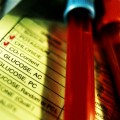Know Your A1C
Valuable for those with Type 1 Diabetes
Find out how much you know about the hemoglobin A1c test (also called A-1-c). Mark each statement true or false. Then see how you did by checking the correct answers and explanations on this page. a1c
- An A1c test measures the average amount of glucose in your blood over the last 3 months.
- It’s important to know your A1c number.
- All people with diabetes need to have an A1c test.
- The A1c goal for people with diabetes is less than 7 percent.
- Most people can tell what their blood sugar levels are simply by how they feel.
- You can do something about high blood glucose.
- An A1c number over 8 percent is a sign that one or more parts of your treatment plan needs to be changed.
- There’s no proof that lowering your A1c number can reduce your chances of getting serious eye, kidney and nerve damage.
- True. The A1c test shows the average amount of glucose (sugar) in your blood over the last 3 months. The A1c is the best test to find out if your blood glucose is under control over a period of time.
- True. If you know your A1c number, you will have a sense of your diabetes control. A result above 8 percent is a sign that you should work with your health care provider to change your treatment plan. A 7 percent or lower result is a sign that your treatment plan is working, and your blood glucose is under control.
- True. All people with diabetes should have an A1c test at least twice a year and up to four times a year. If your blood glucose levels are too high or too low, work with your health care provider to reach your target level of control.
- True. The A1c goal for people with diabetes is under 7 percent. But, if you can lower your A1c number by any amount, you will improve your chances of staying healthy.
- False. Research shows that few people can tell their blood glucose levels simply by how they feel. Checking your blood glucose is the only way to know for sure whether you reach your blood glucose goals.
- True. You can do a lot to bring down high blood glucose levels and get them under control. Start by asking your health care provider for an A1c test. If your A1c test result is too high, talk to your health care provider about how to lower it. To get your blood glucose under control, follow the meal plan recommended by your health care provider, increase your physical activity, take your prescribed diabetes medicines and consult your health care provider often.
- True. A change in treatment is almost always needed if your A1c is higher than 8 percent. Common causes of high blood glucose include eating too much food or eating the wrong foods, lack of physical activity, stress, a need to increase and/or change medicines and infection or illness. If your A1c number is too high, work with your health care provider to change your treatment plan.
- False. Recent studies show that the lower the hemoglobin A1c number, the greater the chances that you will slow or prevent the development of serious heart, eye, kidney and nerve damage.









